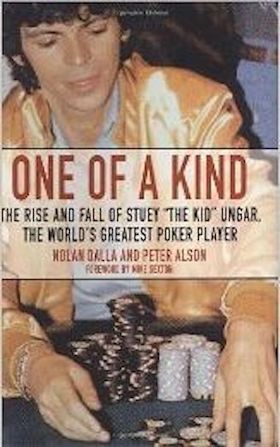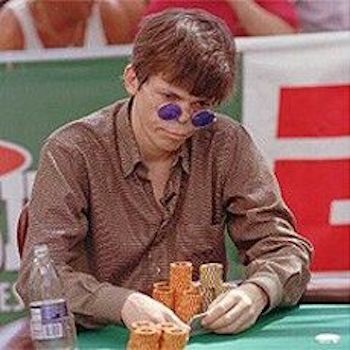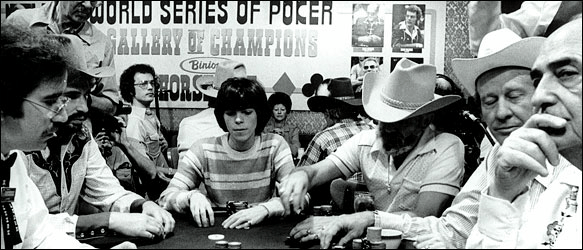We continue to honor the memory of poker legend Doyle Brunson, who passed away last month at age 89, by sharing an old article where the Godfather of Poker discussed his relationship with another passed poker legend, Stu Ungar. Enjoy the story below.
Over the years of dealing with players and gangsters, I met a lot of colorful characters, some I would hardly believe if I did not know them personally. It cannot be said that they all became my friends, but there was something special about each of them upon closer inspection. They filled my life with colors – and for this, I have always loved Las Vegas. This city is full of unique personalities.
Recall, for example, Stu Ungar, the Lost Soul. He was the only person to win the WSOP Main Event three times. A similar achievement is attributed to Johnny Moss, but he received the first title as a result of voting and actually won only twice. The movie " High Roller: The Story of Stu Ungar " was made about Ungar, and it pretty accurately reflects what really happened.
Despite the fact that Stu was a close friend of mine, our relationship was constantly teetering between love and hate. I have never met a more arrogant and rude player in my life. I think he was the only one I almost hit at the poker table. Moreover, in terms of weight, I was three times his size, and I wanted to hit him far more than once. The way he behaved was simply unbearable. He threw cards at the dealers and cursed like a retired sailor. He could spit at the dealer who dealt the wrong card. Once at the Golden Nugget casino, he swore at the dealer so much that she called the manager, took off her badge, and said: "I'm quitting." After that, she turned to Stu and added: "And you, you son of a bitch, I'm waiting at the exit." She was a large woman, and Stu wisely declined her offer.
But outside of the game, I just adored him. And women too. He was smart, charming, with an amazing sense of humor. I don't know what his IQ was, but for some reason, I'm sure that Stu was a genius. He had all the talents needed to achieve poker prowess, except for one thing – discipline. And for this reason, he is not among the strongest players in history. But if he learned to control himself, he would become the best.

Stu knew his weaknesses. His biography One of a Kind has a particularly revealing quote: “Old poker wisdom says that the biggest enemy at the table is yourself. So this is about me, you can’t say it more precisely. ” He was one of the most notorious gamblers I knew, and that says a lot. After he won his second consecutive WSOP Main Event in 1981, he was asked how he spent his free time. "When I'm not playing," he told the reporter, "I sleep or eat." Then he was asked what he was going to do with the money he won, and he replied: "I will lose it."
That's what Stu was. He bet on everything – horses, sports, golf, whatever. He once won $800,000 from me in golf, and we went to Nashville to play with someone, where I won everything back from him, plus about half a million more. When we got back to Vegas, he still had money to pay me off, but over the weekend he blew everything on horse racing and sports betting. So nothing was returned.
He made a name for himself by winning back-to-back World Series Main Events in 1980 and 1981. But after that, he became addicted to drugs. After divorcing his wife Madeleine in 1986, he fell even further, but he was hit hardest by the suicide of his adopted son, Ritchie, shortly thereafter. The young man hanged himself with a VCR cord in the parking lot of the Hilton Hotel in Las Vegas. It was said that he had an inferiority complex due to Stu being such a prominent figure. Madeleine told me that Ritchie had assured her that he "would be successful in the next life." All this is very sad.
Stu borrowed money from me for Ritchie's funeral. And then he gave them away.
The drugs ruined Stu's life. His nose burned away from cocaine, and despite the operation, it was not possible to return it to normal.

Stu returned to poker in mid-1997, and it was one of the biggest comebacks I've ever seen. He won his first WSOP championship on the strength of youthful aggression and confidence that grew as the tournament progressed, thanks to a good deal of luck. But in the 1997 championship, he revealed himself in all his splendor. It happened after ten years spent in a drug haze, after the death of a son, after a rehabilitation clinic, and after surgeries to save the nose.
I went to the last two tables with him. He played poker the way a Stradivari would play his own violin. I was sitting in the Horseshoe (ed. the casino that was hosting the World Series at the time) with a cup of coffee in my hand and just looked at him, forgetting about the noise of slot machines and roulette. I was shocked. I knew what physical, mental, and emotional state he was in, and I thought: “This is the best proof of his real abilities. No one knows what he could have achieved if it weren't for the drugs." Heads-up against John Strzemp, the manager of the Mirage casino, he played flawlessly and deservedly won.
Without a doubt, Stu was the best tournament player in the world. His style was perfect for tournaments. But in the cash games, Stu was not among the best. Temperament was his Achilles' heel, he just handed out money on tilt. Sometimes he would get so pissed off at losing a hand that it seemed like he didn't care anymore, and that he was going to lose everything else to the last cent trying to get it back.
And the bitter truth is – as has been proven many times at the poker table, in dog and horse races, and in the course of other gambling entertainments – that he really did not care.

Stu liked to take risks. We played at the same table at Horseshoe a year before he died, and one hand speaks volumes about him. I raised with , Stu 3-bet, trying to take the pot preflop. I knew his game well, so I called. The flop came . He bet and I raised him with my draw to a royal flush. Whatever my hand was, he definitely had outs left, so he made a huge all-in. Of course, I had to call. I flipped my hand over and prepared to negotiate a deal if our odds were close. Stu flipped . I knew these hands weren't too far apart in strength, so I offered to split the pot evenly, or at least take some of the money. Stu was in dire financial straits, so I figured he would at least consider my offer.
"No, let's take a chance," he replied immediately.
Stu stayed true to himself.
The turn and river didn't improve anyone, and Stu took the pot.
He was found dead in a cheap motel room on November 22, 1998, the 34th anniversary of President Kennedy's assassination. Stu was 45. Cocaine and opiates were found in his blood in small quantities, but the cause of death was called a heart attack. “Heart failure developed over time due to lifestyle,” the doctor wrote in the death certificate.
Many poker players came to the funeral, almost everyone invested their money in their organization. They say Stu won more than $30 million in his life, but died penniless, a year and a half after winning the third World Series championship, where he earned $1 million. I could not come to terms with this tragedy for a long time, such a talented young man buried himself in the ground.
On May 14, 2011, Stu was posthumously inducted into the Poker Hall of Fame. The ceremony at the Horseshoe was attended by two hundred of the world's strongest players, along with his ex-wife and daughter.












